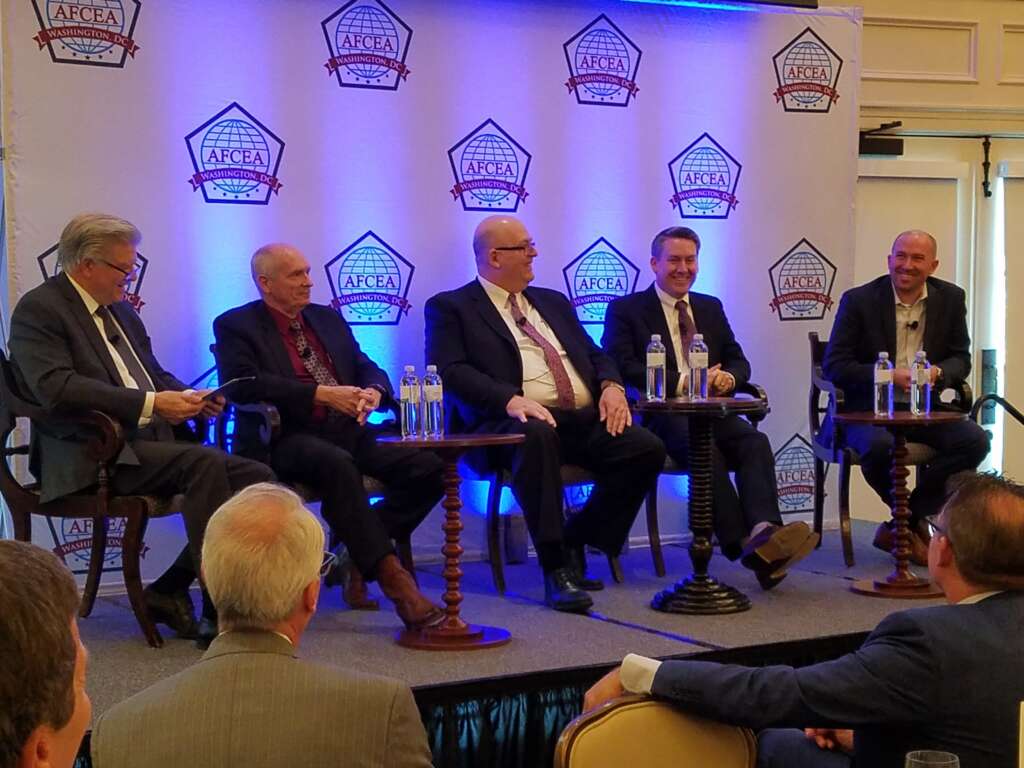

DISA is moving toward iterative or agile approaches to acquisition and projects in order to avoid planning and implementation mistakes of the past.
Best listening experience is on Chrome, Firefox or Safari. Subscribe to Federal Drive’s daily audio interviews on Apple Podcasts or PodcastOne.
Tony Montemarano recently made a plea to a packed room of vendors: “We need you to deliver on contracts.”
The executive deputy director of the Defense Information Systems Agency isn’t telling industry anything they don’t already know. But after canceling, or in government speak not picking up the options of two contracts last year, Montemarano felt it was worth pressing that message into the hearts and minds of contractors.
“The biggest issue I have as the acquisition executive as I overlook all the programs, I see failures of development efforts on the part of our managers and the industry supports who are involved. When you bid the contract, we love it for you to be as aggressive as possible. But we need you to deliver,” Montemarano said at the AFCEA DC lunch on Jan. 16 in Arlington, Virginia. “The fact of the matter is we’ve had to terminate more than one contract this year because the vendor hadn’t been developing the product we needed them to develop.”

He declined to offer any more specifics about the contracts or who the vendors were, saying his goal was not to embarrass the contractor, but to educate the broader audience.
Montemarano is quick to point out the blame doesn’t sit solely on the shoulders of the vendors. DISA also was responsible for the contract problems, which caused one of the programs, which focused on command and control systems, to have its schedule slip by a year.
The message to industry and the lessons learned by DISA were clear. Contractors need to be smarter about how they bid on contracts, providing DISA with aggressive, yet well-thought-out plans, while DISA is getting away from the “big bang” and moving toward a more modular approach to contracting.
“We collectively have to be a good team. One thing we can’t control is if a vendor low balls it and then can’t deliver. Given the current personnel situation we have in our business, it’s hard for vendors to hire the right people and it’s hard for us to have the right people,” Montemarano said in an interview after the panel. “What’s very important is we come to grips with the fact this is not 1990 anymore. In 1990, DoD wrote the code for everything and did all the development. We don’t do that anymore. It doesn’t work. Given the business we are in, it’s pretty much exploiting commercial solution sets and just adapting to military applications. Given that’s the environment we are in today, we should be able to produce better.”
He said DISA is now using an iterative approach for the command and control program that fell behind and for other similar efforts.
The message to industry about how DISA’s expectations are changing isn’t just coming from acquisition, but also from the technical side.
Steve Wallace, a system innovation scientist in DISA’s Emerging Technology Directorate, said any successful program begins by government and industry having honest conversations about what is possible.
“Don’t promise us the world. Let’s have a legitimate conversation about technology, the weaknesses and the strengths. Anytime someone comes in and tells me about all the great and wonderful things, but doesn’t talk about any of the potential pitfalls or where things may need to get better, it instantly sends me into a defensive, ‘What are they not telling me?’” he said. “As we meet with you all and have those conversations, let’s really talk about those strengths and weaknesses. It’s not because I’m trying to use it against you, it’s because I’d rather find it out upfront and figure out a way together that we can work it out.”



Dave Bennett, the director of DISA’s operations center, added vendor proprietary solutions aren’t helpful when the agency’s environment is so disparate with hardware and software that is 30-40-50 years old.
Montemarano and the others’ comments are both refreshing and poignant.
Too often agencies do not cancel, or do not pick up the option, on contracts because it’s just too difficult to start over. And too often, agencies are not willing to stand up to vendors when programs go awry for fear of lawsuits and more delays.
The fact DISA not only terminated two contracts, taking some of the responsibility for the failure and talking about it publicly is an important step to making the procurement process better.
While DISA is far from perfect with its contracting efforts — there still is a hangover in industry about the agency’s use of lowest-price technically acceptable (LPTA)—there is an important recognition of how it needs to change to ensure long-term success of its programs.
Copyright © 2024 Federal News Network. All rights reserved. This website is not intended for users located within the European Economic Area.
Jason Miller is executive editor of Federal News Network and directs news coverage on the people, policy and programs of the federal government.
Follow @jmillerWFED
